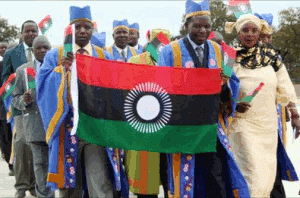BLANTYRE, MALAWI, 25 October, 2010 – Malawi could grow its exports, increase access to credit for businesses and grow foreign direct investments – all through a unique brand of insurance. This is according to senior officials of the African Trade Insurance Agency (ATI) – Africa’s only multilateral insurer which is owned by various African states, including Malawi. During a series of workshops targeting banks and insurance brokers, the Agency’s officials explained how trade credit and investment insurance products could free up credit and attract investors into Malawi. ATI’s Senior Underwriting Officer, Humphrey Mwangi along with ATI’s Malawi and Zambia Representative, Pizzaro Lukhanda led the workshops.
An ATI-led workshop aimed at educating the banking and insurance industries on the importance of trade and investment insurance to boosting Malawi’s competitiveness.

In the World Bank’s 2010 Doing Business Report, Malawi dropped by three points to 132 out of 183 countries in the accessing credit category. The global financial crisis has seen many western buyers of African products default on their payments. In Malawi, as in many other African countries, this has impacted local banks’ appetite to lend to exporters due to the high credit risk associated with export trade. This is where institutions like ATI become most relevant. With Trade Credit Insurance, for example, Malawian exporters can approach their banks with the ATI policy as collateral. The ATI cover also gives exporters the confidence to conduct more business on credit terms, hence expanding their sales volumes.
Besides exporters, importers too can benefit from Trade Credit Insurance. Malawi importers are often called to pay up front for their goods because they are unable to negotiate credit terms with their foreign suppliers who often cite default risks as well as foreign currency challenges.
Trade credit insurance is a product that exporters in Europe and North America have been using since the beginning of the last century. Traders from these markets are insured by their national export credit agencies against risks such as non-payment, enabling them to do business anywhere in the world. This makes them more competitive than African exporters, who often trade on cash against documents or Letters of Credit terms of payment, which ties up their collateral – their goods – for weeks and months. ATI was created to act as Africa’s export credit agency, offering many of the same services that could help increase Africa’s competitiveness.
On the investment side, since 2007 investors and lenders have obtained Political Risk Insurance (also known as Investment Insurance) to cover over $68 million worth of loans to the energy, services and Information Communications Technology sectors in Malawi. These largely African and Asian investors may have been less likely to invest in Malawi without this type of insurance protection. Specifically, investors obtain this insurance to protect their investments against government actions or inactions that may impact negatively on their business interests.
“These products are not new. What ATI is hoping to do is decrease the knowledge deficit that exists about these unique products because there is no reason that Malawi cannot compete with exporters in Asia and Europe,” noted Mr. Mwangi, ATI’s Senior Underwriting Officer.
To help boost Malawi’s global competitiveness, ATI began underwriting trade credit insurance policies in the Malawian market last year. Though the product can increase the price that exporters receive for their goods by as much as 50% while also reducing their bank financing costs, the challenge ATI faces is lack of awareness of the product in the Malawian marketplace.
ATI’s unique advantage is that African countries such as Malawi are members. They have invested their money in ATI, therefore governments have no reason to cause any claims through such acts as expropriation and nationalization. Investors are reassured by this relationship and have chosen ATI‘s political risk insurance over foreign-based companies, precisely because ATI is an African institution with a clear understanding of the challenges and opportunities inherent in the business environment here.
The Malawi market continues to show strong demand for ATI’s products reflected in a robust project pipeline. Already in 2010, up to the third quarter, ATI has responded to enquiries valued at $68.2 million for both trade credit and political risk insurance products.